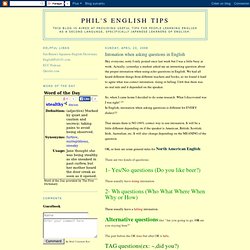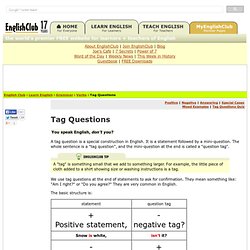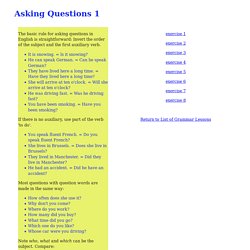

Intonation when asking questions in English. Hey everyone, sorry I only posted once last week but I was a little busy at work.

Actually, yesterday a student asked me an interesting question about the proper intonation when using echo questions in English. We had all heard different things from different teachers and books, so we found it hard to agree what was correct intonation: rising or falling. I felt that there was no real rule and it depended on the speaker.So, when I came home I decided to do some research. What I discovered was I was right! ^^In English, intonation when asking questions is different for EVERY dialect!!! 1- Yes/No questions (Do you like beer?) 2- Wh questions (Who What Where When Why or How)These usually have a falling intonation. Alternative questions like "Are you going to go, OR are you staying here? " The part before the OR rises but after OR it falls. TAG questions(ex: ~,did you?) This restaurant is terrible, isn't it? You're coming to the party, aren't you?
Here is a bit more info from wikipedia( Phil P.S. Word Order in Questions. Tag Questions. A tag question is a special construction in English.

It is a statement followed by a mini-question. The whole sentence is a "tag question", and the mini-question at the end is called a "question tag". A "tag" is something small that we add to something larger. For example, the little piece of cloth added to a shirt showing size or washing instructions is a tag. We use tag questions at the end of statements to ask for confirmation. The basic structure is: Notice that the question tag repeats the auxiliary verb (or main verb when be) from the statement and changes it to negative or positive. A question tag is the "mini-question" at the end.
We will now look at positive statement tag questions. Asking Questions. The basic rule for asking questions in English is straightforward: Invert the order of the subject and the first auxiliary verb.

It is snowing. = Is it snowing? He can speak German. = Can he speak German? They have lived here a long time. = Have they lived here a long time? She will arrive at ten o'clock. = Will she arrive at ten o'clock? He was driving fast. = Was he driving fast? If there is no auxiliary, use part of the verb 'to do'. You speak fluent French. = Do you speak fluent French? Most questions with question words are made in the same way: How often does she use it? Note who, what and which can be the subject. Who is coming to lunch? Note the position of the prepositions in these questions: Who did you speak to? Return to List of Grammar Lessons.